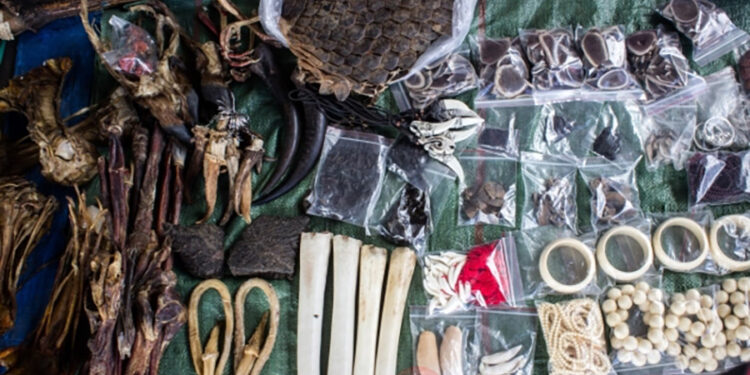RANGOON — Rhino horns and illegal wildlife products from several African species are being openly offered for sale in Mongla in eastern Shan State, according to a new report.
Researchers from the wildlife monitoring organization TRAFFIC, WWF and Oxford Brookes University found shops in Mongla selling horn as well as a range of other protected wildlife, including whole elephant tusks, carved elephant ivory, carved hippopotamus teeth, and tiger skins.
“The species on offer, including high-value species not native to Myanmar and several African species, suggest that organized criminal syndicates are involved in the wildlife trade between Myanmar and Africa, sometimes via China,” stated the report titled Rhinoceros Horns in Trade on the Myanmar–China Border.
Surveys of the markets of Mongla, the town notorious for its illegal wildlife industry near the China border, found a single rhino horn in 2014. The following year, a second rhino horn, a single horn tip, small discs from the core of a horn, horn powder and horn bangles were observed, all openly for sale in high-end shops.
The whole horns and horn tip were all believed to be from African white rhinoceroses, according to TRAFFIC.
Mongla is known to cater mainly to Chinese tourists, with prices quoted in Chinese yuan and many transactions carried out in Chinese, the release said.
Rhino poaching in Africa is a direct result of increasing demand in Southeast and East Asian countries where cultural and medicinal beliefs render rhino horn “a luxury good, an investment opportunity and a status symbol,” according to TRAFFIC.
Earlier surveys by the same researchers in 2006 and 2009 did not find horn for sale. Chinese citizens have been increasingly implicated in rhino horn trafficking, with a number of arrests in both Africa and Asia.
“The growth in Chinese interest in rhino horn is a huge concern—it could generate levels of demand that would spell doom for the world’s rhinos,” said Dr. Chris R Shepherd, TRAFFIC’s regional director for Southeast Asia and an author of the new study.
China and Burma are both signatories to the Convention on International Trade in Endangered Species of Wild Fauna and Flora (CITES).
This makes any cross-border trade in rhinoceros horn illegal as all commercial international trade in rhinos is prohibited. However, Mongla lies in territory outside of the Burma government’s control.
“With no Burma government presence currently in Mongla, in our view it is imperative that the government of China intensifies its scrutiny and enforcement efforts at the Mongla–Daluo border crossing, making it a non-viable option for smugglers,” the researchers said.
China recently announced the partial closure of its domestic ivory market.
As the ivory ban becomes fully implemented, the significance of markets such as those in Mongla selling ivory, rhino horn and other threatened wildlife products is likely to increase, the researchers said, making the need for policing of nearby border crossings of paramount importance.

















